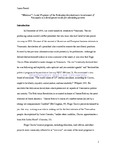"Misiones": Social Programs of the Bolivarian Revolutionary Government of Venezuela as a Development Model for Alleviating Poverty

View/
Author
Ferrell, Jamie
Subject
Washington and Lee University, Shepherd Poverty Program
Venezuela
Public welfare
Poverty
Economic assistance, Domestic
Social justice
Educational change
Health care reform
Chávez Frías, Hugo
Metadata
Show full item recordDescription
Jamie Ferrell is a member of the Class of 2008 of Washington and Lee University. Capstone; [FULL-TEXT FREELY AVAILABLE ONLINE] Hugo Chavez's social programs, including education, land reform, and other projects more commonly referred to as “misiones”, are some of the most progressive aspects of his government. . . . Not only do the misiones provide the social services commonly associated with the word, they also serve as a way to spread the word and ideals of the revolution. . . . These programs are notable because of the unique holistic approach that the government adopted in order to address the multi-faceted issues of poverty. The goal of the programs and misiones is not only to provide the basic services that the citizens of Venezuela need, but to also insure that everyone is healthy and prepared to be involved in the participatory democracy that “would finally eliminate the vestiges of colonialism and dependency” (Hawkins, 103). Not all recognition of the programs is positive. There are many critics that chalk the misiones up as little more than government propaganda or as a vehicle for promoting the revolutionary ideas. This paper seeks to look at both the purported successes of the programs, as well as the evaluations, to evaluate the efficiency of the misiones as a development model and a method for alleviating poverty. [From Introduction] Jamie Ferrell